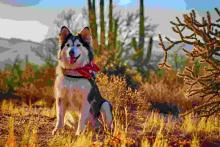Undetermined Canine Infectious Respiratory Disease Complex (U-CIRDC)

There are a number of different pathogens that can cause respiratory disease in dogs that are primarily transmitted through the air by mucus droplets when dogs breathe and especially when they cough and are in close or immediate contact with other dogs. These include pathogens like Bordatella bacteria that cause Kennel Cough, Canine Influenza and Canine Parainfluenza Viruses. There are also other causes of respiratory disease which dogs can pick up from their environment and the soil such as fungal Valley Fever. Clinical signs of respiratory disease include coughing, difficulty breathing, sneezing, nasal and/or eye discharge, and lethargy.
As everyone is well aware, there has been significant media coverage surrounding an Undetermined Canine Infectious Respiratory Disease Complex (U-CIRDC) in the last 2 weeks which has generated a significant amount of public interest and increased reporting from private practitioners and pet owners alike. Similar cases have been recognized in other states for nearly 2 years and several groups are working to identify what the definitive cause of this disease manifestation is. The Arizona Department of Agriculture (AZDA) and the Office of the State Veterinarian are working with veterinarians in the state to collect data on suspect cases to determine the extent and impact of this disease.
AZDA would encourage dog owners not to panic and to simply practice good common sense in ensuring that their animals are up to date on all common vaccines, exercise caution when taking animals to locations or venues where dogs may be commingled (community dog parks for example) preferably avoiding shared water bowls or direct contact with unfamiliar dogs. Additionally, dog owners should consider discussing with the management of any doggy day care, boarding kennel, grooming facility etc. what their biosecurity precautions and mitigation strategies are for premises disinfection and limiting exposure to or admission of dogs with signs of illness in order to make sound, informed decisions and to protect the health of your pet as much possible. If dog owners suspect their animal is developing illness, they should seek consultation with their attending veterinarian as soon as possible.
